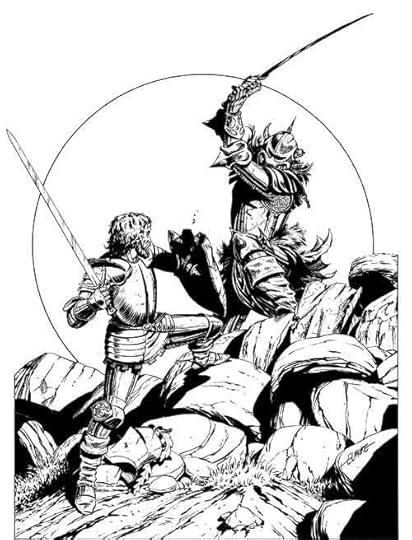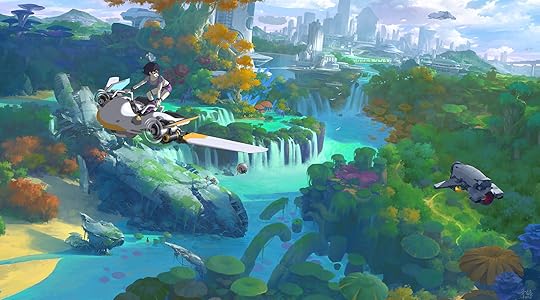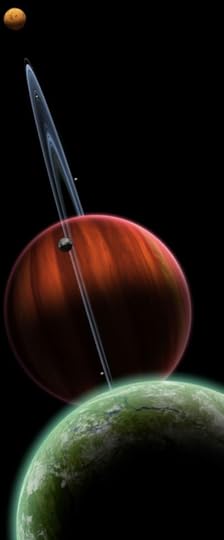Juho Pohjalainen's Blog: Pankarp - Posts Tagged "settings"
Bad Parenting
I think I finally tackled an analogy I've been working on for a while now.

Picture you had some terrible parents. They're constantly at odds with each other. It's not for certain that you're biologically theirs (though many believe you are), or that they didn't have you by accident.
A lot of people would not even be aware of these parents existing, and go along with their lives as if this was the case.
But others would take sides.
Let's say you went along with your dad. You agreed with him in everything, partly because you believe what he says, and partly because he gives you great rewards and weird powers. It's up to you which one of these is more important. In turn, you shun your mother and oppose her wherever you can.
Then it gets wonky. The thing is, you yourself are made of your two parents, more or less in equal amounts. But the more you go along with your dad, the less like your mother you resemble.
Say you had once her eyes? Well, not anymore. Her very genetic code gets slowly but steadily erased out of you. Eventually there's nothing but your dad in you.
This is what it would be like to follow either the concept of Law or Chaos too far. To think that the world would be better off with full order, or disorder, and forget that it needs both to exist. By mortal reckoning, the champions of either aspect are pretty legitimately insane.

Peal, in this analogy, would be well aware of his parentage, but choose to avoid both sides. Whenever one of the two is getting too powerful, he punches them in the groin. Peal is a problem child.

Picture you had some terrible parents. They're constantly at odds with each other. It's not for certain that you're biologically theirs (though many believe you are), or that they didn't have you by accident.
A lot of people would not even be aware of these parents existing, and go along with their lives as if this was the case.
But others would take sides.
Let's say you went along with your dad. You agreed with him in everything, partly because you believe what he says, and partly because he gives you great rewards and weird powers. It's up to you which one of these is more important. In turn, you shun your mother and oppose her wherever you can.
Then it gets wonky. The thing is, you yourself are made of your two parents, more or less in equal amounts. But the more you go along with your dad, the less like your mother you resemble.
Say you had once her eyes? Well, not anymore. Her very genetic code gets slowly but steadily erased out of you. Eventually there's nothing but your dad in you.
This is what it would be like to follow either the concept of Law or Chaos too far. To think that the world would be better off with full order, or disorder, and forget that it needs both to exist. By mortal reckoning, the champions of either aspect are pretty legitimately insane.

Peal, in this analogy, would be well aware of his parentage, but choose to avoid both sides. Whenever one of the two is getting too powerful, he punches them in the groin. Peal is a problem child.
Published on September 03, 2019 16:30
•
Tags:
analogies, chaos, cosmic-forces, eternal-conflicts, fantasy, law, musings, parents, settings
Grimdark, Noblebright, Little People, Big Stories
Warhammer 40,000 is one of the most relentlessly bleak and horrific fictional settings ever imagined. It's an endless war that dominates the entire galaxy, and has virtually every life revolving around it one way or the other. Even the afterlife was corrupted by it, many millions of years ago, completely beyond repair: the spiral into final death and darkness cannot be stopped or slowed down, and in the end they're all doomed.

This often raises a question: why then should you care? If everybody is doomed anyway, what's the point? The usual answer - it's the people, the individuals. The few precious lives whom you can save, or protect, or destroy. They're in peril, and you're in position to help. And if you do, they may live the remainder of their natural lives in relative happiness and peace and comfort. And that's something you should always cherish, and always fight for. You can't solve the grand underlying problems of the world - no one can - but you can do your share to help somebody. Every life is precious.
So now my mind drifts on: what about the opposite?
My own setting is as bright and hopeful as I can make it - a golden age of high adventure where I myself would not mind living. If a grimdark setting is a bleak reflection of our world and a reminder that things can always be better, then I guess a noblebright one is more of escapism and wish fulfillment with perhaps a dash of hope for a better future. In the former case you can't do anything to make things better in the grand scheme of things; in the latter, you don't really need to.

But we're still not looking for any sweeping great reforms: we're looking at the little folks. And because nothing can ever be perfect - especially not mankind with our flaws and sins - they're still menaced and victimized, their lives and livelihoods in danger. The reader still feels their plight, and once the hero has come around to save them, their gratitude.
I guess the takeaway here is that the setting doesn't really have too much of a relevance, in the grand scheme of things. It's big and imposing and scary, but it's the little things you want to focus on. Maybe that's no big news to anyone here, but then again... lately, Warhammer's been pulling the lens back and covering the entire setting, bringing forth grand changes and raising the stakes. Things are coming to a head. It feels like it might be End Times all over again.
And I'm really not a fan. The older I get, the tougher time I have getting into these vast, galaxy-wide conflicts. They feel... hollow.
But I also understand that Games Workshop needs to sell more models.


This often raises a question: why then should you care? If everybody is doomed anyway, what's the point? The usual answer - it's the people, the individuals. The few precious lives whom you can save, or protect, or destroy. They're in peril, and you're in position to help. And if you do, they may live the remainder of their natural lives in relative happiness and peace and comfort. And that's something you should always cherish, and always fight for. You can't solve the grand underlying problems of the world - no one can - but you can do your share to help somebody. Every life is precious.
So now my mind drifts on: what about the opposite?
My own setting is as bright and hopeful as I can make it - a golden age of high adventure where I myself would not mind living. If a grimdark setting is a bleak reflection of our world and a reminder that things can always be better, then I guess a noblebright one is more of escapism and wish fulfillment with perhaps a dash of hope for a better future. In the former case you can't do anything to make things better in the grand scheme of things; in the latter, you don't really need to.

But we're still not looking for any sweeping great reforms: we're looking at the little folks. And because nothing can ever be perfect - especially not mankind with our flaws and sins - they're still menaced and victimized, their lives and livelihoods in danger. The reader still feels their plight, and once the hero has come around to save them, their gratitude.
I guess the takeaway here is that the setting doesn't really have too much of a relevance, in the grand scheme of things. It's big and imposing and scary, but it's the little things you want to focus on. Maybe that's no big news to anyone here, but then again... lately, Warhammer's been pulling the lens back and covering the entire setting, bringing forth grand changes and raising the stakes. Things are coming to a head. It feels like it might be End Times all over again.
And I'm really not a fan. The older I get, the tougher time I have getting into these vast, galaxy-wide conflicts. They feel... hollow.
But I also understand that Games Workshop needs to sell more models.

Published on June 30, 2020 06:54
•
Tags:
grimdark, heroes, little-people, noblebright, settings
Moons
Even in fantasy settings far removed from our world, if you look up to the sky, it's going to look much the same as ours: there's the stars, and there's our old friend the moon. There's no need to change this because it's not the focus - the focus is down below, on the people and their struggles. But as in everything, there are exceptions.

Two moons is pretty popular in fantasy, for a good reason. It makes things of the world and its standing far more clear: as soon as you look up, you realize we're not in Kansas anymore. Instantly you get the feeling that this is quite a bit farther removed from our own world. That things are going to be different here. A good author will capitalize on this: you can't just have the second moon hover there and do nothing, you have to make it mean something, do stuff. If nothing else, the setting's people will have worked their mythology around it.
Pictured above is the Warhammer world's dreaded Morrslieb: whenever it's full, things are going to get weird indeed. Another example is Masser and Secunda from the video game series The Elder Scrolls: they're actually the sundered decaying corpse of a dead god, the first and most obvious sign of the trippy, drug-fueled, absolutely friggin' bonkers nature of the entire setting. Final Fantasy IV and Beast Wars each have two moons, and reveal great things about the second one. The setting of Warcraft has a second moon, except then it didn't, and now it does again. The setting of the musical project Bal-Sagoth mentions a couple times a third moon that fell from the heavens, meaning there's probably still two up there. It comes up a lot... even if not all of them take full advantage of it.
You can get the same thing across with just one moon, by making that one moon a little bit weird and fantastic - in a meaningful way, of course - but two moons makes for a very nice fantastic imagery that's hard to beat. You can also add more, but it tends to have diminishing returns: Dragonlance gets away with three, but it really binds them to its magic system in a way that really makes it impossible to have any less, but Eberron's twelve moons, while tying up a bit to its theme of thirteen-minus-one, is just excessive. At the opposite end there's the moon of Forgotten Realms, Selûne, which just has a few glittering comets following it around: enough for just a bit of imagery while not taking too much of our time, subtle and very nice.
The weirder you get with your night sky, the more it kidnaps the reader's attention, drawing focus out of the earthly matters where it should be. But if you do not properly tie up all the other moons and stuff into the world, it just comes across as gratuitous and overcompensating - it's a wasted effort you'd have been better off to put elsewhere. It's very hard to marry both with a good middleground.
But that's all fantasy. In science fiction, it's a whole other story: the eye can be drawn to the stars all the time, because the protagonists often actually go up there. They get to visit all sorts of weird constellations and gas giants and moons and what have you. The focus is up in the skies, so the skies should reflect this - if not in the main character's own boring-ass homeworld, then elsewhere.

My own setting not only has half a dozen moons to it - it is a moon, in itself, all of them orbiting around the same gas giant, making for a real lightshow up there. The stories seem just straight-up fantasy at first, but gradually, more scientific matters come up, rockets and lasers and trips to the stars... and the night sky is an early clue of this. To set the true score of things from the very beginning, if you look at it the right way and think the same way I do.
The protagonist Peal is very small by any measure of things, and yet he has his entire world to look after. But whenever he looks up to the sky, he realizes - his beat is pretty small too. There's so much more out there, so many greater and more important matters, interplanetary and interstellar and galactic affairs some people are saddled with. All in all things could be worse for him. He's got this.

Two moons is pretty popular in fantasy, for a good reason. It makes things of the world and its standing far more clear: as soon as you look up, you realize we're not in Kansas anymore. Instantly you get the feeling that this is quite a bit farther removed from our own world. That things are going to be different here. A good author will capitalize on this: you can't just have the second moon hover there and do nothing, you have to make it mean something, do stuff. If nothing else, the setting's people will have worked their mythology around it.
Pictured above is the Warhammer world's dreaded Morrslieb: whenever it's full, things are going to get weird indeed. Another example is Masser and Secunda from the video game series The Elder Scrolls: they're actually the sundered decaying corpse of a dead god, the first and most obvious sign of the trippy, drug-fueled, absolutely friggin' bonkers nature of the entire setting. Final Fantasy IV and Beast Wars each have two moons, and reveal great things about the second one. The setting of Warcraft has a second moon, except then it didn't, and now it does again. The setting of the musical project Bal-Sagoth mentions a couple times a third moon that fell from the heavens, meaning there's probably still two up there. It comes up a lot... even if not all of them take full advantage of it.
You can get the same thing across with just one moon, by making that one moon a little bit weird and fantastic - in a meaningful way, of course - but two moons makes for a very nice fantastic imagery that's hard to beat. You can also add more, but it tends to have diminishing returns: Dragonlance gets away with three, but it really binds them to its magic system in a way that really makes it impossible to have any less, but Eberron's twelve moons, while tying up a bit to its theme of thirteen-minus-one, is just excessive. At the opposite end there's the moon of Forgotten Realms, Selûne, which just has a few glittering comets following it around: enough for just a bit of imagery while not taking too much of our time, subtle and very nice.
The weirder you get with your night sky, the more it kidnaps the reader's attention, drawing focus out of the earthly matters where it should be. But if you do not properly tie up all the other moons and stuff into the world, it just comes across as gratuitous and overcompensating - it's a wasted effort you'd have been better off to put elsewhere. It's very hard to marry both with a good middleground.
But that's all fantasy. In science fiction, it's a whole other story: the eye can be drawn to the stars all the time, because the protagonists often actually go up there. They get to visit all sorts of weird constellations and gas giants and moons and what have you. The focus is up in the skies, so the skies should reflect this - if not in the main character's own boring-ass homeworld, then elsewhere.

My own setting not only has half a dozen moons to it - it is a moon, in itself, all of them orbiting around the same gas giant, making for a real lightshow up there. The stories seem just straight-up fantasy at first, but gradually, more scientific matters come up, rockets and lasers and trips to the stars... and the night sky is an early clue of this. To set the true score of things from the very beginning, if you look at it the right way and think the same way I do.
The protagonist Peal is very small by any measure of things, and yet he has his entire world to look after. But whenever he looks up to the sky, he realizes - his beat is pretty small too. There's so much more out there, so many greater and more important matters, interplanetary and interstellar and galactic affairs some people are saddled with. All in all things could be worse for him. He's got this.
Published on June 27, 2021 05:02
•
Tags:
bal-sagoth, dragonlance, fantasy, fantasy-worlds, final-fantasy, forgotten-realms, moon, moons, night-sky, science-fiction, setting-musings, settings, shala, sky, the-elder-scrolls, warcraft, warhammer
Pankarp
Pages fallen out of Straggler's journal, and others.
Pages fallen out of Straggler's journal, and others.
...more
- Juho Pohjalainen's profile
- 352 followers



